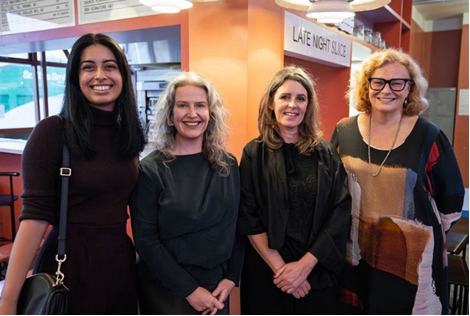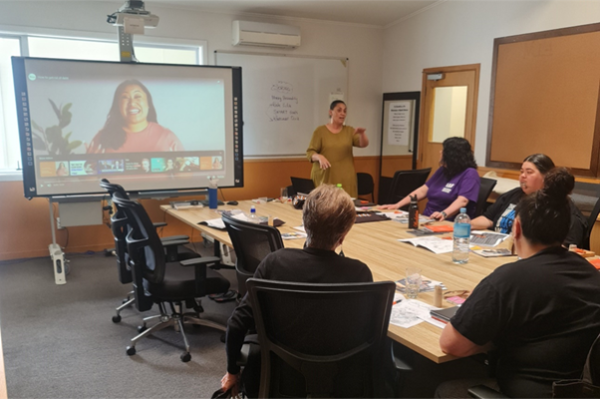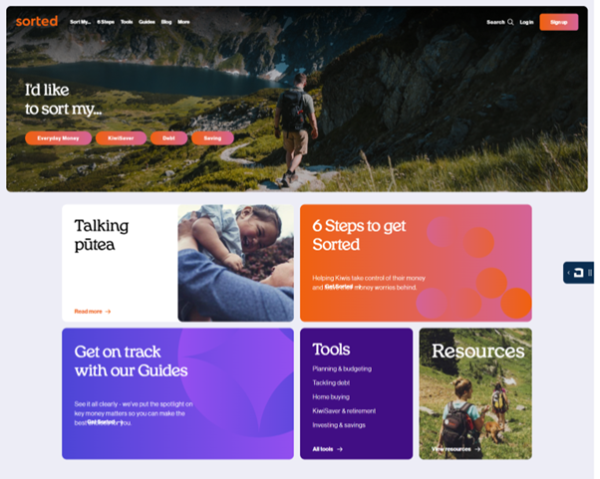Kia ora tatou and welcome to our quarterly update
 The year has got off to a roaring start with some exciting launches and important events coming up in the next few months.
The year has got off to a roaring start with some exciting launches and important events coming up in the next few months.
Firstly, we've just launched a fantastic new look for Sorted which includes better accessibility, enhanced mobile design, clearer content navigation and a more visually engaging experience.
Since I started in this role four years ago, a key priority for me has been advocating for more stable and consistent thinking around superannuation in New Zealand. I recently released a paper suggesting a political accord on NZ Super on how to deal with issues in the future, including a legislated scheduled review process, as well as outlining policy options that could be considered. I maintain that keeping the age of eligibility at 65 is the best one for now.
In my view, a long-term political accord is essential to provide certainty for future generations of retirees and to encourage sound decision-making. We are keen to continue this conversation among those working in the public pensions space, so will be bringing together some of the country's leading academics, political commentators, politicians, and economists at our Super Summit event in Wellington next week. It will be an opportunity to discuss and debate views on NZ Super, considering the challenges and opportunities it presents for Aotearoa. We’ll publish a record of proceedings and hope that these discussions will assist with policy development in coming years.
Then in May we will head into our National Strategy for Financial Capability conference in Auckland where I hope to see many of you in person. This year’s focus is ‘Shifting the dial’ and we have secured a brilliant line-up of speakers and panelists for the day. If you don’t have your ticket yet, you can get it here. I am particularly looking forward to reconnecting with you all and putting our heads together to plan what we want to achieve in the next National Strategy.
After welcoming the new Government in November, and the Minister I report to, Hon Andrew Bayly, our briefings to the incoming ministers were released last month. We prepared two this time, one for the Minister of Commerce and Consumer Affairs and one for the Minister of Education, both focused on practical ideas that we believe can get things moving for financial wellbeing.
I have enjoyed getting out and about in recent months to some inspiring industry and community events. A highlight was speaking at two “The Table” Power. Money. Security workshops, run by Ange Meyer and funded by Mercer, where a large group of women came together to discuss financial literacy, the retirement gap and the significance of financial independence and wellbeing across their lives. As we know, becoming comfortable talking about money and goals is the first step.
We have also been busy finalising some key projects from the 2021-2024 National Strategy, before we jump into developing a new strategy later this year. A proposed shared measurement tool for financial capability was launched for consultation last month along with accompanying research, and has invoked some deep thinking around the outcomes we really want to achieve in terms of ‘financial wellbeing’. We would love to hear your feedback if you haven’t provided it already.
We are also currently doing final testing for the shared resource hub, another project outlined in the strategy. Along with the shared measurement tool, this project arose from calls across the sector for better opportunities to share research and insights among you all, and to understand what actually works. We will be seeking feedback from partners on the hub once it is ready, stay tuned for an update when it goes live.
Finally, I would like to acknowledge our highly valued Director of Policy and Research, Dr Suzy Morrissey, who will be leaving Te Ara Ahunga Ora later this month to pursue new opportunities overseas. Suzy has been an integral part of our leadership team, has developed a high performing policy team, and provided invaluable insights and thought leadership that will be missed. I wish her all the best for her next endeavour.
I look forward to working with you all more in the year ahead.
I orea te tuatara ka puta ki waho
A problem is solved by continuing to find solutions
Jane

National Strategy for Financial Capability 2024 conference
Our next National Strategy conference is just two months away! Join us in Tāmaki Makaurau Auckland from 8 to 9 May 2024 to connect, collaborate and learn more about how the financial capability community is shifting the dial and working together to help New Zealanders understand money.
Highlights include:
- Frances Valintine, founder and CEO of The Mind Lab and Tech Futures Lab, and one of the most influential educators and innovators in the world, on the future of financial education.
- Jane-Renee Retimana, Chief Strategy & Innovation Officers at Payments NZ, and a leading authority on how open banking will change the game and help our customers and communities.
- Learn what's happening behind the scenes across the financial capability ecosystem including how banking, community, and the financial education sector are helping New Zealanders grow their money and build resilience.
- Connect with others and share your insights and experiences (with a special focus on target audiences).
- Shape the future of the new National Strategy and how we can work together for the next three years.
What are good outcomes for financial capability and how do we measure them?
An ongoing challenge for those working to lift financial capability is the lack of a clear way to measure progress and success. Not having agreed outcomes and common metrics makes it challenging to share progress and know we’re making an impact.
To tackle this, we have scanned the globe delving into research on measuring financial capability and wellbeing and conducted interviews with financial capability providers in New Zealand. This has led to defining 10 good financial capability outcomes, focusing on growth and resilience, as well as a survey-based tool to measure changes from an intervention. The findings and analysis are also included in a research paper.
We want to hear your feedback on the 10 good financial outcomes and the supporting question-based tool to measure progress. Have your say by 6 April here. When this project is completed the sector will be able to measure common outcomes and share data in a way that will help us all to continually improve service delivery.
Latest research from partners
Fidelity Life Assurance released new research in February, finding more than a quarter of New Zealanders feel their financial situation is out of their control and the majority of New Zealanders don’t feel confident making financial decisions until age 55. The Advice for good: Rethinking New Zealand’s relationship with financial advice report was commissioned to explore attitudes towards financial advice and how to overcome the barriers to seeking professional guidance. This report is an example of the valuable research that will be shared with National Strategy partners in the shared resource hub.
Financial capability programme for Māori

The new financial capability programme for Māori Te Rito Hou has been piloted across the motu and further enhanced, including the addition of a banking component. The programme, which was developed in partnership with Māori bankers rōpū Tāwhia, was piloted with workshops in Tairāwhiti Gisborne, Te Waiharakeke Blenheim, and Ōtautahi Christchurch. We also presented the programme at the inaugural Tāwhia conference in September.
A comprehensive summary report of the pilot's outcomes will be released later this month, accompanied by recommendations to the New Zealand Banking Association for future actions. This is a key ‘shift the dial’ initiative in the National Strategy for Financial Capability.
What's new for sorted.org.nz
The Sorted website has seen great engagement over the last quarter, with 272,937 users, 4,548 of whom were new users. Our overall brand awareness, which is monitored through an always-on research tracker with TRA, lifted to 56% in November. It was great to see that this was primarily driven by an increase in awareness among 18–34-year-olds and Māori, audiences we are actively targeting at present.
Sorted Money Month is back for 2024
Following its success and popularity amongst stakeholders in 2023, we will be bringing Money Month back in August for 2024! The theme this year will be ‘Pause. Get sorted’ again, encouraging New Zealanders to take a moment to reflect on their money and take simple steps to improve their situation.
We are holding a webinar for stakeholders on Wednesday 27 March, where we will run through our plans for Money Month, share what partners have done in the past, and talk about how you can get involved.
New look and feel for Sorted

If you visited the Sorted website this week, you may have noticed a refreshed look and feel. The team has been busy working on our brand strategy to ensure Sorted content stays relevant for priority audiences and reaches them in the moments that matter. Through this brand refresh, we hope to see the Sorted brand become more relatable and to extend our reach among the people we believe we can help the most.
New budget planner

We launched a new Sorted budget planner this week, which will take the place of the old budgeting tool. The new planner is designed to help users prioritise their money and drive it towards the things that matter most. It includes a new tailored insights experience, which highlights users’ non-essential spending to help guide them towards improved money management.
We’re on The Morning Shift!
Sorted and New Zealand’s biggest podcast, The Morning Shift, are joining forces to redefine how New Zealanders talk about money. The Morning Shift has had more than 3.1 million downloads and amassed 442,000 followers on Tiktok since it started in March 2023. The trio have real conversations about all things culture, sports, entertainment, and the day-to-day with their own special blend of humbleness, humour and vulnerability.
The Sorted collaboration is three-part series where the hosts interview Te Ara Ahunga Ora Retirement Commission’s Sorted experts on key money topics like budgeting, homeownership and investing. Check out the first episode here.
Te whai hua – kia ora, Sorted in Schools
Sorted in Schools was recognised on the world stage with a mention in the World Economic Forum’s January insight report on Longevity Economic Principles. The programme was included as a case study of principles in practice and described as “designing for inclusion”.
We launched "Sort it Out", a collection of resources to help secondary graduates preparing to leave school. The resources include a booklet and online interactive activities, which guide students through key financial decisions like starting studying, going flatting and buying their first car.
Research
We released a paper in March outlining various policy options and considerations for NZ Super and maintaining that the age of eligibility should stay at 65 for now. The Retirement Commissioner is calling for a political accord on Super. The simplicity of NZ Super’s design is internationally envied and New Zealand’s expenditure on its pension is relatively low compared to other OECD countries. Current and future recipients say that they want to see its broad eligibility maintained without means-testing.
We also released a new study in December looking at the often-unforeseen financial impacts of health conditions as people age. In-depth interviews were conducted with older people grappling with disabilities or experiencing difficulties with a physical condition since turning 65 and the additional expenses they face. This research is also a nudge to those able to plan their retirement income to factor in increased health costs.
In October we released new research on the costs of breaking up after 50. The research looked into the complex journey of dividing assets after a relationship break up later in life and the financial impact this has on retirement.
Retirement villages
The Ministry of Housing and Urban Development received around 11,000 submissions on its discussion paper on the review of the Retirement Villages legislative framework. We proposed a review of this legislation in 2020 and released a white paper setting out issues. The Act has not been reviewed in 20 years. The Ministry is currently analysing the submissions and developing policy proposals and we look forward to seeing active decisions by Government.
Key Dates
Super Summit – Wellington
21 March 2024
National Strategy for Financial Capability Conference - Auckland
8–9 May 2024
Money Month
August 2024